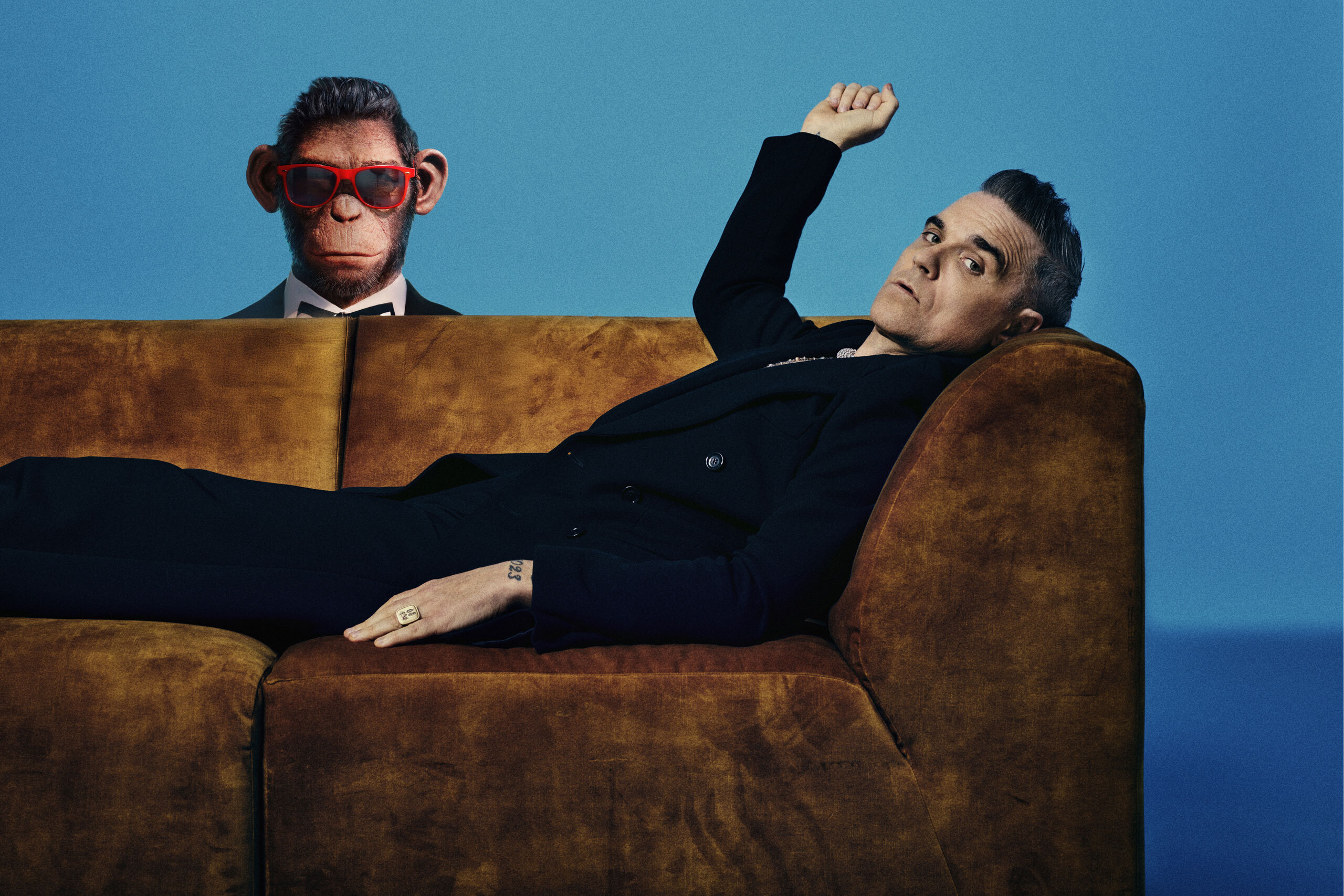WHAT EVERYONE SHOULD BE TALKING ABOUT THIS WEEK
It’s Robbie Williams seeing himself exactly as he is, in all his glorious contradiction.
Words: Dan Harrison.
When Robbie Williams decided to portray himself as a CGI monkey in his biopic, he once again proved why he’s British pop’s most fascinating star. It’s not just the audacity of the choice – though transforming Britain’s most successful male solo artist into a digital primate certainly qualifies as audacious – it’s how perfectly it captures the essence of Robbie himself. Here’s a man who has spent three decades turning self-awareness into a spectacle, who understands that sometimes the truest version of yourself is the one that seems most absurd to others.
‘Better Man”s bold creative choice feels less like a director’s vision and more like Robbie’s own clear-eyed understanding of what he represents. “I’ve always seen myself as a little less… evolved,” he states in the film’s trailer, but there’s more to it than that. After all, this is the entertainer who turned ‘Let Me Entertain You’ into both a mission statement and a knowing wink to the audience – a stadium-sized acknowledgement that show business is both deadly serious and utterly ridiculous. When you’ve mastered the art of being simultaneously the biggest thing in British pop and its most astute critic, why wouldn’t you see yourself as a digital primate in your life story?
The numbers – more UK albums sold than any solo artist in history, only The Beatles and Rolling Stones ahead of him in Number 1s, enough BRIT Awards (18) to leave no room in the downstairs loo – tell one story. But they miss the beautiful contradiction at the heart of the Williams phenomenon: how a working-class lad from Stoke-on-Trent became Britain’s biggest star while finding this ability to see the whole thing as gloriously silly. This is, after all, the man who followed up his swing revival album with a song about all his singles being absolute bangers, delivered with enough self-mockery to make the boast both accurate and hilarious.
His rise feels like a fairy tale from a vanished age: the boy band apprenticeship, the carefully orchestrated solo launch. Yet from his first post-Take That single – the gloriously pointed ‘Freedom’ – Williams displayed an uncanny ability to be both the star and the person watching the star, turning every performance into a meditation on performance itself. At Knebworth, at the height of his powers, he managed to make a crowd of 375,000 feel both the scale of the spectacle and the ridiculousness of one man commanding such attention. Every practised move came with genuine feeling, every heartfelt ballad delivered with the understanding that sincerity and spectacle aren’t mutually exclusive. Yes, at times Robbie has been self-destructive, taking the less obvious path, but he’s never, ever been boring – and as he ages with just the right balance of grace and madness, he becomes even more of a national treasure.
This is what makes him the last great entertainer of the old school – not just his mastery of the spotlight but his complete understanding of what that spotlight means. Watch him on stage: he’s simultaneously the consummate showman and the kid who can’t quite believe his luck. ‘Angels’ becomes both a genuine moment of mass connection and a knowing commentary on the power of the lighter-waving ballad.
His ‘Inside The Mind’ documentary series didn’t just show his struggles with fame – it turned those struggles into another form of performance, one that acknowledged the impossibility of true authenticity in an age of constant documentation. His battles with mental health, addiction, and the psychological toll of fame weren’t just confessions but careful examinations of stardom itself. ‘Come Undone’ and ‘Strong’ turned personal demons into pop anthems without losing their bite; ‘No Regrets’ managed to dissect boy band politics while still working as a soaring chorus. While other celebrities were still pretending to be untouchable, Williams was turning his vulnerabilities into stadium-sized singalongs, understanding that the greatest connection comes from acknowledging the distance between star and audience.
Which brings us back to that monkey. Where recent music biopics strain for authenticity through period-perfect costumes and meticulous recreations, ‘Better Man’ seems to understand something fundamental about its subject: Robbie Williams has always been most real when he’s acknowledging the artifice. The digital fur and animated expressions might capture something more honest about both the man and modern fame than any attempt at faithful recreation ever could.
Would the Robbie who jumped ship from Britain’s biggest boy band to become an even bigger solo star, who turned his struggles with addiction and mental health into chart-topping poetry, who made Knebworth feel like both the biggest and most intimate gig in history, choose to tell his story straight? Of course not. The CGI monkey isn’t just a creative flourish – it’s Robbie Williams seeing himself exactly as he is, in all his glorious contradiction.
Whether ‘Better Man’ can pull off its ambitious vision remains to be seen, but the choice itself feels like pure Robbie – grandiose, self-aware, and somehow both deeply serious and utterly playful. The trained monkey in entertainment’s endless circus hasn’t just learned the tricks, he’s written the whole damn show and he’s not afraid to show us exactly how the magic works.

Leave a Reply